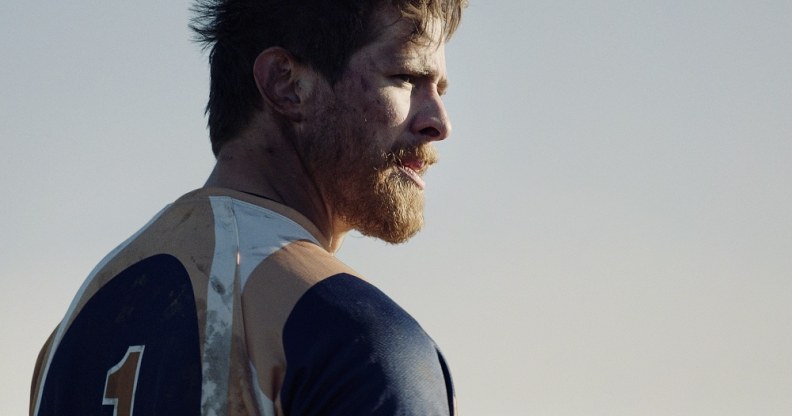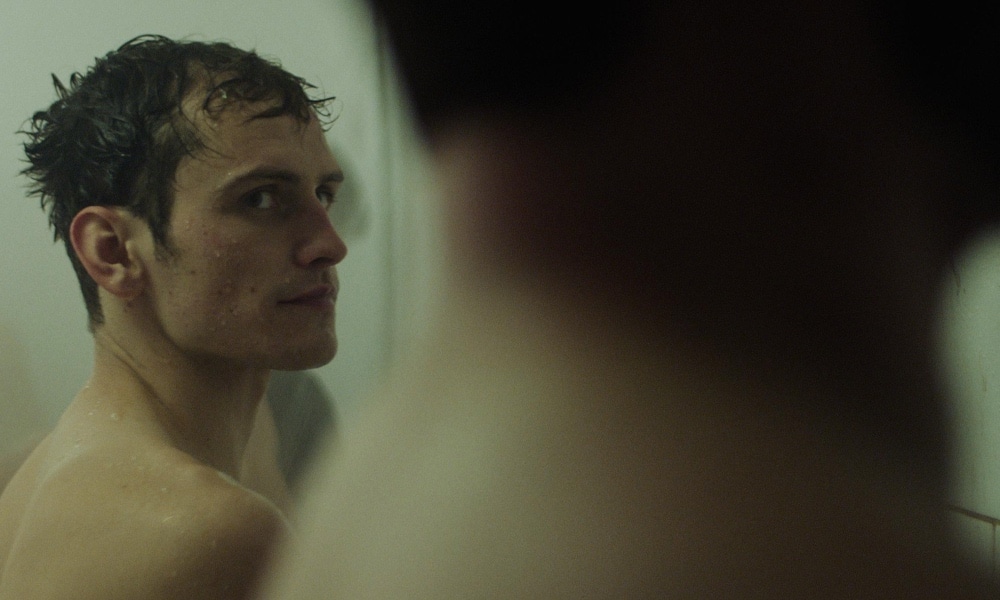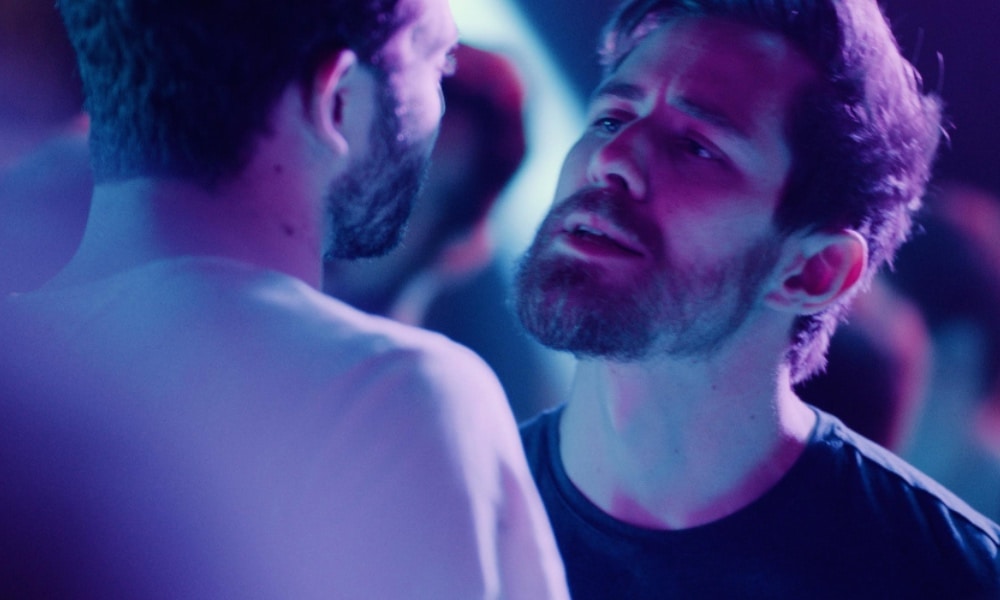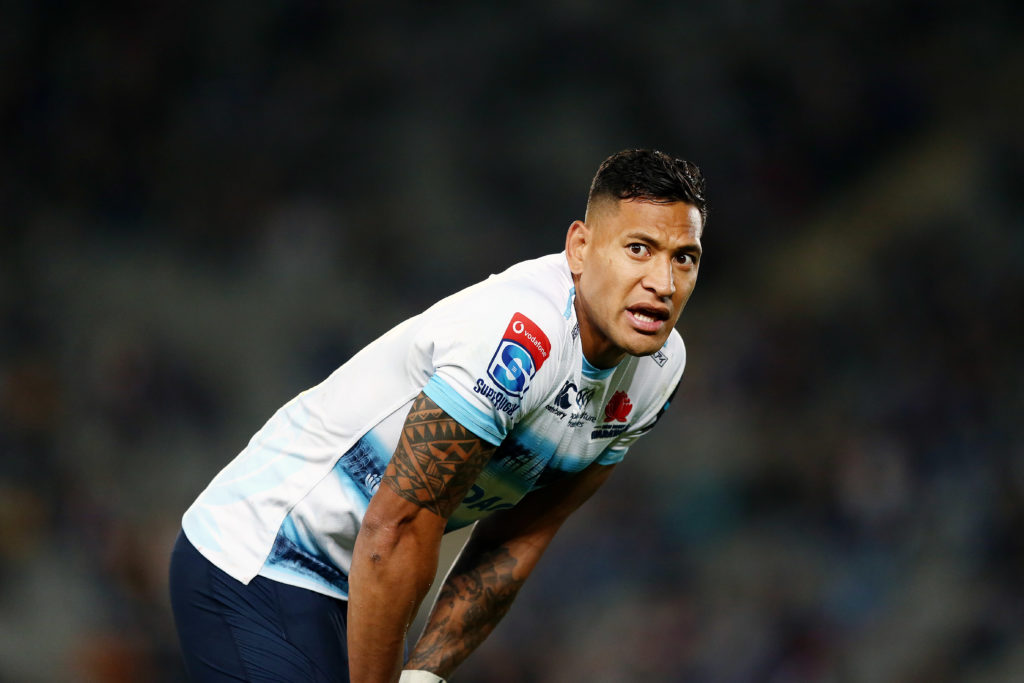Director of acclaimed gay rugby film In from the Side on mud, sweat and ‘idiot’ homophobes

Alexander King stars as Warren in In From The Side. (BFI London)
Alexander King stars as Warren in In From The Side. (BFI London)
For British filmmaker Matthew Carter, rugby is a lot more than big men pounding each other – and it definitely doesn’t include “idiots” like Israel Folau.
Himself a rugby player and coach, In from the Side is Carter’s love letter to rugby. Full of towering actors who are 70 per cent shoulders, the film premiered at the BFI Flare: London LGBTQIA+ Film Festival.
The film is a muddy, sweat-filled look into the lives of queer rugby players in London as they navigate love. B-team back Mark (Alexander Lincoln) is caught between two men – his distant older boyfriend and A-team player Warren (Alexander King).
Carter, who works with the Brighton and Hove Sea Serpents, told PinkNews that In from the Side captures how rugby can offer a blueprint for other sports to embrace inclusion.
PinkNews: Walk us through In From The Side, where did the idea come from?
Matthew Carter: I’ve been involved in inclusive rugby for about eight years as a player, coach and referee. Rugby has always been this vibrant culture I’ve been so fascinated by.
There are so few rugby films anyway, let alone ones that explore queer sports. I think there are a lot of ‘coming out’ and ‘homophobia’ films and I was interested in getting beyond that.
My co-writer, Adam Silver, and I said we didn’t want to make a film like that – there’ll be no coming out or homophobia. They’re all self-actualised individuals and once you free yourself from that, you’re forced to explore much more deep topics.
Were there any experiences you wished you delves into a bit more or you weren’t able to tackle?
We had to hone in and focus on the central storyline – a uniquely forbidden love story. It doesn’t come from homophobia or coming out, it’s a film about monogamy, adultery and open relationships which aren’t explored very much in other gay films.

Gareth (Carl Loughlin). (BFI London)
There are so many things we wanted to explore, but we already had a lot of characters and spent time differentiating them all to make them feel like real people.
The film isn’t preachy, it’s very morally ambiguous about whether the characters are right or wrong. There isn’t a single character that isn’t irredeemable, they all have past trauma which makes them understandable.
A lot of people ask at the end, ‘Am I supposed to feel sorry for any of them?’, because it’s not obvious in the film. That’s very much by design.
What kind of role does the culture of rugby itself play in the film?
It’s the foundation we witness these stories on that adds colour and flavour to it. Rugby is this unique, old world with a lot of heritage to it. And in inclusive rugby, we try to uphold this heritage.
There’s something very special about it and it has affected my life. LGBT+ people in rugby can be transformative and I hope this film does that, too. Sport isn’t something for just the heteronormative world, it’s also about breaking stereotypes.

Alexander Wing’s Warren talks to Mark (Alexander Lincoln) in a nightclub. (BFI London)
There’s this assumption that rugby is toxically masculine because of the sheer physicality of the sport – but that says more about people’s assumptions than it does the sport itself. Why can’t something physical be off-limits to gay men?
When we get people to play rugby, you see their confidence growing and they realise: ‘Hey, I can do this. This isn’t just for straight people.’ It’s a healthy expression of masculinity.
There’s no one kind of rugby player and if we didn’t have that culture of ultimate respect in rugby, it would be a blood bath.
Why is sport so important for LGBT+ people?
It really boils down to a sense of community and belonging that I feel a lot of gay men haven’t had or don’t get because we don’t have as many community spaces in the modern world anymore.
Team sports are something a lot of gay men probably didn’t get to experience at school because it wasn’t for them. Now you find droves exploring again as adults and realising the power that can have.
We have this collective of people who come together for a shared purpose, a shared goal and for your health. It’s so unbelievably wholesome and it fills that void you didn’t realise was even there.
A phrase you often hear is ‘rugby family’. You don’t always get along perfectly but it’s that sense of tolerance for people who are different and you love each other.
Do you have any thoughts on Israel Folau, Australia’s once star rugby player whose contract was terminated for telling “homosexuals” that “Hell awaits” them?
When he was dropped, that was fair because those values don’t belong in rugby. It was such an idiotic thing to say.

Israel Folau posted anti-gay messages on social media. (Anthony Au-Yeung/Getty)
We have so many role models in rugby who are championing LGBT+ rights and inclusion. He’s very much in the minority, and I think most people know that.
It’s disappointing that he hasn’t been willing to accept he was wrong.
Do you have any advice for other sports where anti-LGBT+ attitudes are more common?
There are two ways to approach inclusion in sport. You have an organisational level, such as the British governing body of rugby, the Rugby Football Union, and then you have the grassroots side.
The RFU work hard to forward inclusion in sport, though World Rugby says slightly anti-trans things. Even on the grassroots level, you’re missing out on a wealth of players if you exclude people.
In inclusive clubs, I think the need for them is diminishing. So many local clubs happen to have a large proportion of gay players which is a testament to the sport.
I’d say to other sports, if you want to miss out on all that talent to hold homophobic ideas, you need to set your egos aside.
In from the Side will have its international premier at Lovers Film Festival in Turin, Italy, on 26 April. For more information on In from the Side click here.

